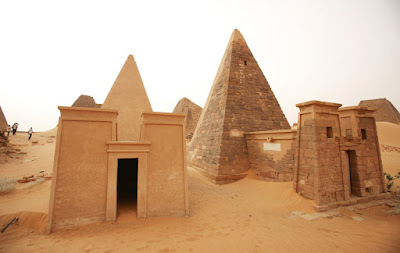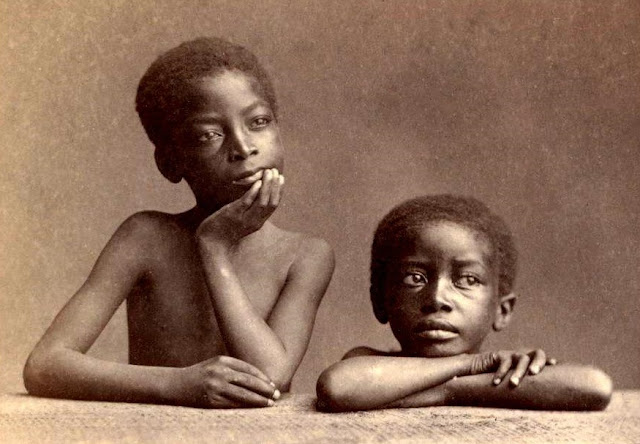Africa - A History of Mystery
Why do I say that? Because it is the truth. Often times when people in the “Western World” hear about Africa, their first perceptions are of people running around naked in a jungle. It is not easy for them to break free of this narrow perspective either as this popular view has been held for many centuries until now! When we study Black History, we are told about all the negative aspects of the past. We learn of wars, genocide, famine, poverty, disease, and death. You can never outpace the best of what you know your limits to be. I can assure you that the African youth of today don’t even know the African youth of yesterday and even worse, they are not taught about their wonderful history at school either-the very institution which claims to grant essential knowledge and truth. Why is African History important?
Here is a quote by 18th Century British Statesman Edmond Burke: “Those who don’t know history are doomed to repeat it”.
 |
| Credit: National Portrait Gallery |
In many countries around the world, people descended from Africans were taught that the African people contributed nothing to humanity when Africa is the birthplace of civilization and Africans are acknowledged as the first to walk the Earth. We were kidnapped from our nations, our language was stripped from us and our names were changed. For years we have had to live as second-class citizens in our own countries. During the era of Slavery, we were not allowed or able to read about our rich African legacy. Now that it has been done away with for 150 + years, how do we fair today? People across the African Diaspora and in Africa itself, should be well acquainted with who they are and their potential for success as encouraged by the great legacy of their people. As an African-American, I will speak on the statistics here in this place that is considered to be the beacon to the world – The Leading Superpower. These may serve to provide some context to a situation in which people are devoid of what is commonly referred to as “The Knowledge of Self”.
In 2013, the population of African Americans including those of more than one race was estimated at 45 million, making up 15.2% of the total U.S. population.
Those who identified only as African American made up 13.2% of the U.S. population-over 41.7 million people.
83.7% of blacks 25 and over had a high school diploma or higher in 2013.
(Source: 2013 American Community Survey)
(Source: 2013 American Community Survey)
19.3% of blacks 25 and over had a bachelor’s degree or higher in 2013.
The annual median income of black households in 2013 was $34,598, compared with the nation at $51,939.
Source: U.S. Census Bureau, Income, Poverty and Health Insurance Coverage in the United States: 2013
Source: U.S. Census Bureau, Income, Poverty and Health Insurance Coverage in the United States: 2013
The poverty rate in 2013 for blacks was 27.2%, while nationally it was 14.5 percent.
Source: U.S. Census Bureau, Income, Poverty and Health Insurance Coverage in the United States: 2013
Source: U.S. Census Bureau, Income, Poverty and Health Insurance Coverage in the United States: 2013
Among households with a black householder, 61.8% contained a family in 2013. There were 9.8 million black family households.
(Source: 2013 Current Population Survey, Families and Living Arrangements, Table HH-1 and F1)
(Source: 2013 Current Population Survey, Families and Living Arrangements, Table HH-1 and F1)
Among families with black householders in 2013, 45.7% were married couples.
(Source: 2013 Current Population Survey, Families and Living Arrangements, Table F1)
(Source: 2013 Current Population Survey, Families and Living Arrangements, Table F1)
According to a 2013 Education Week study, about 62% of African Americans completed high school in 2010 compared to 80% of white students. Overall, rates of high school dropout have fallen steadily since 1990. The Schott Foundation for Public Education reported that, “In 2009-10 the national graduation rate for black male students was 52%. (The graduation rate for white, non-Latino males was 78%.) This is the first year that more than half of the nation’s black males in 9th grade graduated with regular diplomas four years later.”
According to the National Center for Education Statistics, from 1976 to 2011, “the percentage of black students [enrolled in college] rose from 10% to 15%. (During the same period, the percentage of white students fell from 84% to 61%.)
As an added bonus, here are some startling statistics on health, wealth, crime, and single motherhood that I would rather not talk about myself:
The median white household had $111,146 in wealth holdings in 2011, compared to $7,113 for the median black household. The typical black household now has just 6% of the wealth of the typical white household.
The Black Unemployment Rate is consistently twice that of Whites, says the Pew Research Center.
Nearly 40 percent or 5.6 million African American homes in the U.S. have zero or negative net worth." Blacks only makes up about 1.4% of the top 1% of wealthy households in this country despite all the great black entertainers we see all the time. The
real wealthis the other 94% whose median is much, much greater in proportion.
Of all the Fortune 500 CEOs in America, only 5 are African-American (less than 1%).
 |
Nigerian businessman Aliko Dangote
|
While the problems that these statistics present are due to various factors such as access to opportunity and discrimination, an issue with the motivation of African-Americans towards advancement in society is also part of the equation. We have, more than ever, the promotion of media amongst our youth that says nothing about the great accomplishments of Africans. We have almost no movies or shows at all about Africans other than white-washed Hollywood dramas of what they think will attract the highest ratings and make the most money about Ancient Egypt and we have a plethora of slave TV series and films – all within the last few years.
 |
It was startling for many to see the great general of Carthage in Africa played by a Black man who looked like an African on the History Channel – a more historically accurate depiction compared to the typical alternative white or Arab guy they were expecting. In Europe earlier this year, British academics were outraged that a new course was teaching the truth of their history – that Africans arrived in England before the English (even though the scientific theory of Human Global Migrations should have taught them that).
 |
Credit: Alien Invader by Kapax
|
But I wonder: how many of us know that the world’s first planned city was in Africa, that there were empires in Africa besides Egypt that were
 |
Credit: Abd Raouf / AP
|
that Gold mining was a massive industry all across the continent throughout its history,
that the wealthiest man in world history was from West Africa, that hundreds of cities and neighborhoods were established in 14th - 16th century West Africa with vast empires/kingdoms, palaces, mansions, and schools while Europeans were just making advancements in marine travel,
that west African scholars of the 16th century were known to have thousands of books,
that South Africans established a civilization besides having wandering tribes,
that Africans were already studying the stars and creating a lunar calendar before the 4th century, that ancient Africans were highly advanced in the field of medicine with knowledge of autopsies and effective C-section surgery, that East Africans were part of Southeast Asian society for centuries traveling between there and Africa, and that North Africans ruled the Iberian Penninsula for almost 800 years, bringing agricultural methods and architectural innovations to the Europeans among other things and were part of these societies even after the crusades to drive them out?
Very, Very Few. And yet, these are probably the most basic of things that should be common knowledge for most people who have had a primary education of world history. Heck…some of the very people who brought Africans to the shores and traded them off to other lands (who were actually forced to do so in reality), were of African royalty.
Few Africans are taught of these facts themselves. Many of us don’t know what Africa was like before the 21st century because we were not taught. Many of us do not know how slavery shaped the continent because we were not taught. Many of us do not know of the imperialism and colonial exploits that took place throughout the early 20th century in Africa to change things to how they are today because we were not taught. Evidently, there are some of us who don’t even know that Africa is a continent comprised of 54 countries and not a country of itself!
 |
Credit: Africa Flag Map by lg-studio
|
This is supposed to be the motherland where all the people of the world originated and yet we are taught almost nothing about it.
When we study the subjects of philosophy, astronomy, science, and mathematics in the west and in the places in which western perspectives are taught, we learn nothing of the knowledge in these fields which was taught to virtually all of the people held to be the earliest pioneers. When we study mythology and religion, we learn nothing of the influence and practice of spiritual traditions among Africans and their presence in even non-African traditions (Ex: Greek mythology, Christianity, Islam, and Buddhism).
When we study music, we learn almost nothing of the origin of music theory and instruments in the African culture or the genres which Africans themselves established. When we think of beauty, we think almost nothing of the beautiful people that embody the diversity of the entire world and yet, historically, Africans were profiled in art and described for their very striking physique. According to the Image of the Black Archive & Library project site of the W.E.B. DuBois Research Institute at Harvard University, there exist today 30,000 items identified by their team alone to be People of Color, many of which are from outside of Africa and date back to ancient times!
For us not to teach all of these things is tantamount to us considering Africa as completely irrelevant to the world. It sends a message that not only does the history of Africa not matter to us, but Africa’s future does not really matter much either. For years in Africa, the unity of communities was valued. For years in Africa, the forming of societies that heralded great enterprise and power was commonplace. If we only knew how much African people were able to achieve, we would truly understand what we are capable of. We would not have these statistics that we see today. We would remind each other of this greatness, we pass this knowledge down to our children, and to the world. The good news is that we are just making advances in our study of African history in recent times. Curricula, publications, and museum collections are being revised. Although there are still parts of African (and Pan-African history), modern mainstream academia still refuses to explore (but that’s for another time), we have seen our worldview take a step forward. As more attention is being drawn to this issue, more people in positions of influence are starting to think about this more and as these conversations about Africa continue to be had, we can be even more certain that the next generation will not know the full truth about just how ignorant we were about our world in our time.
– By Omri Coke.
This is a re-publishing. The original article from 6/11/16 can be found here:






Comments
Post a Comment